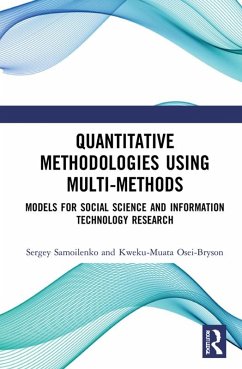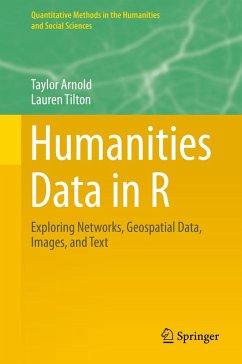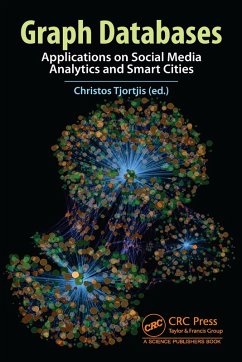
Quantitative Methodologies using Multi-Methods (eBook, PDF)
Models for Social Science and Information Technology Research
Versandkostenfrei!
Sofort per Download lieferbar
44,95 €
inkl. MwSt.
Weitere Ausgaben:

PAYBACK Punkte
22 °P sammeln!
Quantitative Methodologies using Multi-Methods is a multifaceted book written to help researchers. It is a user-friendly introduction to the popular methods of data mining and data analysis. The book avoids getting involved into details that are more suitable for more advanced users; it is written for readers who have, at most, a surface-level knowledge of the methods presented in the book. The book also serves as an introductory guide to the subject of complementarity of the tools and techniques of data analysis. It shows how methods could be used in synergy to offer insights into the issues ...
Quantitative Methodologies using Multi-Methods is a multifaceted book written to help researchers. It is a user-friendly introduction to the popular methods of data mining and data analysis. The book avoids getting involved into details that are more suitable for more advanced users; it is written for readers who have, at most, a surface-level knowledge of the methods presented in the book. The book also serves as an introductory guide to the subject of complementarity of the tools and techniques of data analysis. It shows how methods could be used in synergy to offer insights into the issues that could not be dissected by any single method alone.
This text can also be used as a set of templates, where, given a set of research questions, the investigator could identify a set of methodological modules for answering the research questions of interest. This is not entirely unlike the relationship between the analysis and design phases of the systems development life cycle-where the What of the analysis phase has to be translated into the How of the design phase. The book can guide the identification of modules (the How) that are suitable for answering research questions (the What). It can aid in transitioning a conceptual domain of the research questions into a scaffolding of data analytic and data mining methods.
The book is also a guide to exploring what data under investigation holds. For example, an investigator may use the methodological modules presented in this book to generate a set of preliminary questions which, after a careful consideration and a requisite culling, could be formulated into a set of questions consistent within a selected theory or a framework. Finally, the book can be used as a generator of new research questions. Applying every method in each of the book's modules opens a new dimension ripe with follow-up questions such as, Why is this so? The answers to this question may provide new insight and lead to the development of a new theory.
This text can also be used as a set of templates, where, given a set of research questions, the investigator could identify a set of methodological modules for answering the research questions of interest. This is not entirely unlike the relationship between the analysis and design phases of the systems development life cycle-where the What of the analysis phase has to be translated into the How of the design phase. The book can guide the identification of modules (the How) that are suitable for answering research questions (the What). It can aid in transitioning a conceptual domain of the research questions into a scaffolding of data analytic and data mining methods.
The book is also a guide to exploring what data under investigation holds. For example, an investigator may use the methodological modules presented in this book to generate a set of preliminary questions which, after a careful consideration and a requisite culling, could be formulated into a set of questions consistent within a selected theory or a framework. Finally, the book can be used as a generator of new research questions. Applying every method in each of the book's modules opens a new dimension ripe with follow-up questions such as, Why is this so? The answers to this question may provide new insight and lead to the development of a new theory.
Dieser Download kann aus rechtlichen Gründen nur mit Rechnungsadresse in A, B, BG, CY, CZ, D, DK, EW, E, FIN, F, GR, HR, H, IRL, I, LT, L, LR, M, NL, PL, P, R, S, SLO, SK ausgeliefert werden.













